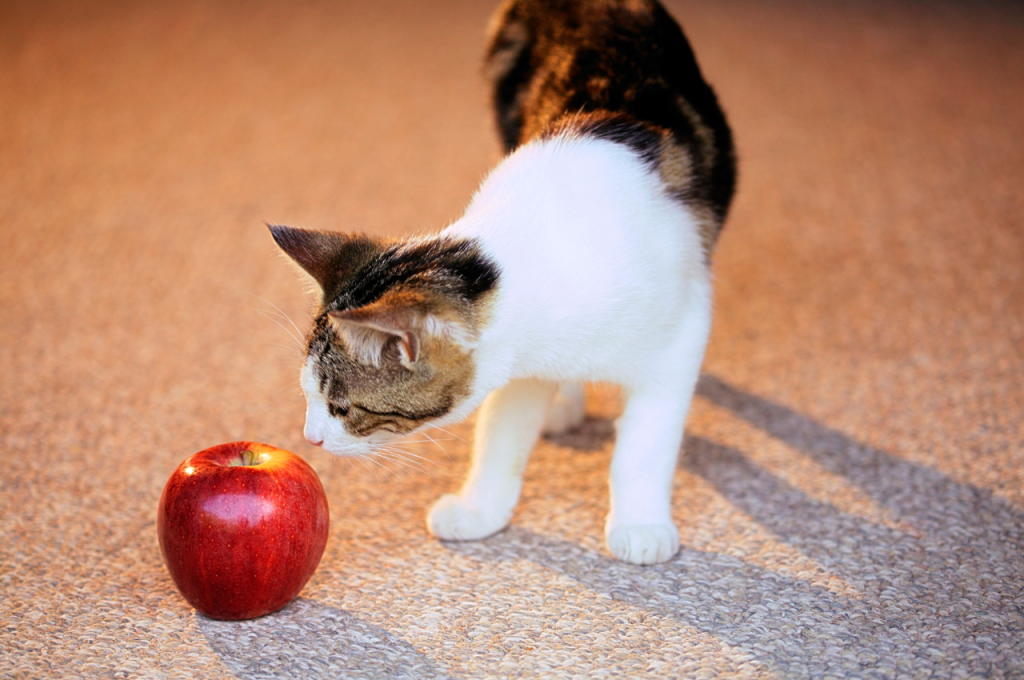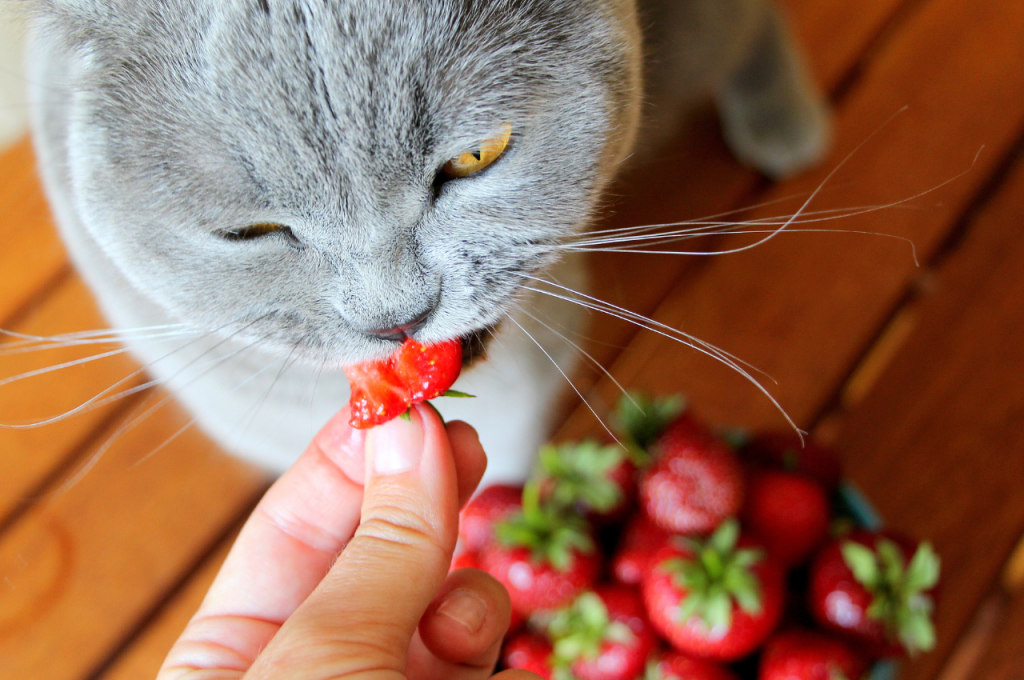Cats can eat fruits like apples, blueberries, and cantaloupe in moderation. These fruits provide essential nutrients for cats.
When it comes to feeding your cat fruits, it’s important to know which ones are safe for them. While cats are primarily carnivores, some fruits can be beneficial when added to their diet in small quantities. Fruits like apples, blueberries, and cantaloupe are not only safe but also provide vitamins, minerals, and fiber that can enhance your cat’s overall health.
However, it’s crucial to avoid feeding cats toxic fruits like grapes and raisins. We will explore the fruits that are safe for cats to eat and the benefits they offer to your feline friend.
Fruit Consumption for Cats
Exploring the realm of cats’ dietary preferences, and understanding fruit consumption for cats sheds light on their natural carnivorous tendencies, potential risks, and limited benefits.

Natural Carnivores
Cats are natural carnivores which means their diet primarily consists of animal protein sources like meat and fish.
Limited Benefits of Fruit Consumption
While cats can occasionally consume small amounts of certain fruits, the benefits are limited due to their digestive system.
Potential Risks of Feeding Fruit to Cats
Feeding excessive fruits to cats may pose potential risks such as upset stomachs or digestive issues.
Safe Fruits for Cats
In the world of fruits, it is essential to know which ones are safe for our feline friends. Cats, being obligate carnivores, have specific dietary needs that need to be met. Here are some safe fruits for cats that you can consider offering as a treat.
Cats and Berries
Berries like strawberries and blueberries are safe for cats to consume in moderation. These fruits are packed with antioxidants and vitamins that can be beneficial for your cat’s health.
Cats and Melons
Melons such as cantaloupe and watermelon are safe for cats to eat. These fruits are hydrating and low in calories, making them a refreshing snack for your furry companion.
Cats and Apples
Apples are safe for cats to eat, but make sure to remove the seeds and core as they can be harmful. Offer small pieces of peeled apple as an occasional treat.
Cats and Bananas
Bananas can be a tasty treat for cats due to their sweetness. They are rich in potassium and fiber but should be given in small amounts as too much can cause digestive issues.
Introducing Fruit to Your Cat
Introducing fruit to your cat can be a great way to supplement their diet with essential vitamins and minerals. However, it’s essential to introduce new foods gradually, keeping a close eye on how your feline friend responds. Read on to learn how to introduce fruit to your cat effectively.
Gradual Introduction
When introducing fruit to your cat, make sure to do so gradually. Start by offering small pieces of fruit as an occasional treat. This allows your cat’s digestive system to adjust to the new food and helps to minimize the risk of any digestive upset.
Observing for Allergies or Digestive Issues
As you introduce new fruits into your cat’s diet, it’s important to observe for any signs of allergies or digestive issues. Keep an eye out for symptoms such as vomiting, diarrhea, or changes in behavior. If you notice any adverse reactions, discontinue feeding that particular fruit and consult your veterinarian for guidance.
Incorporating Fruit into Cat’s Diet
Many cat owners wonder whether it is safe to include fruits in their feline friend’s diet. The good news is that some fruits are safe and beneficial for cats if given in moderation. However, it is essential to be aware of the fruits that can cause harm to cats. In this article, we will explore which fruits a cat can eat and offer suggestions on how to incorporate them into their diet.

In Moderation
While fruits can provide cats with essential vitamins and minerals, they should be given in moderation. Too much fruit consumption can lead to an upset stomach, diarrhea, or even weight gain. Therefore, it is important to feed your cat small portions of fruit as an occasional treat or as part of a balanced diet.
Recommended Preparation Methods
When offering fruits to your cat, ensure they are prepared correctly and presented in a way that your feline friend will find enticing. Here are some recommended preparation methods:
- Cut fruit into bite-sized pieces or mash it to make it easier for your cat to eat.
- Remove any seeds, pits, or cores before serving, as they can be a choking hazard.
- Wash fruits thoroughly to remove any pesticide residues or dirt that could be harmful to your cat.
Remember: always introduce a new fruit slowly and in small amounts to watch for any adverse reactions in your cat. If you notice any signs of an upset stomach or allergies, discontinue feeding that particular fruit immediately.
Forbidden Fruits for Cats
Cats are curious creatures and can sometimes be tempted to nibble on things they shouldn’t. When it comes to fruits, not all are safe for our feline friends. While cats are primarily carnivores, there are certain fruits that they can enjoy as a part of their diet. However, it is important to be aware of the forbidden fruits for cats, as some can be toxic or have harmful effects on their health.
Toxic Fruits for Cats
There are a few fruits that can be toxic to cats and should be strictly avoided. These fruits contain substances that can cause a range of adverse effects, from mild digestive upset to severe poisoning. Here are some examples:
1. Grapes and Raisins: Grapes and raisins can be highly toxic to cats, potentially leading to kidney failure. Even a small amount can be dangerous.
2. Citrus Fruits: Citrus fruits such as oranges, lemons, and limes can cause stomach irritation in cats. They may experience vomiting or diarrhea after ingestion.
3. Cherries: Cherries, especially the pits or seeds, contain cyanide which can be toxic for cats if consumed in large quantities. Cyanide interferes with the cat’s oxygen transport, leading to serious health issues.
Harmful Effects of Certain Fruits
While some fruits may not be toxic to cats, they can still have harmful effects on their health. It is important to keep an eye on what your cat eats and take necessary precautions. Here are a few fruits that can cause harm to cats:
- Canned Fruit: Canned fruits often contain added sugars and preservatives that are not suitable for cats. These can lead to weight gain, dental issues, and digestive problems.
- Avocado: Avocado contains a substance called persin, which can be toxic to cats in large quantities. It can cause vomiting, diarrhea, and even heart problems.
- Tomatoes: While the ripe flesh of tomatoes is generally considered safe for cats, the leaves and stems contain solanine, which is toxic. It is best to avoid feeding cats any part of the tomato plant.
Remember, it is always better to be cautious when introducing new foods to your cat’s diet. If you notice any signs of illness or discomfort after your cat has eaten a fruit, it is crucial to seek veterinary attention immediately. By being aware of the forbidden fruits for cats, you can help keep your feline friend safe and healthy.
Consulting A Veterinarian
When it comes to deciding which fruit your cat can eat, it’s important to consult a veterinarian for professional advice. While there are fruits that are safe for cats, it’s crucial to remember that each cat is unique and may have specific dietary requirements. Additionally, some fruits can be harmful to cats, so seeking the guidance of a veterinarian is essential in ensuring your feline friend’s safety and well-being.
Importance of Professional Advice
Consulting a veterinarian is crucial because they have the expertise to provide comprehensive guidance on what fruits are safe for your cat to consume. They can evaluate your cat’s health, consider any existing medical conditions, and provide recommendations tailored to your cat’s specific needs. Professional advice from a veterinarian can help prevent any potential health issues and ensure that your cat’s diet includes safe and nutritious fruits.
Customized Diet Recommendations
Veterinarians can offer customized diet recommendations based on your cat’s age, weight, activity level, and overall health. They can advise on the portion sizes and frequency of feeding fruits to your cat, taking into account their nutritional requirements. By seeking personalized guidance from a veterinarian, you can ensure that your cat’s diet is well-balanced and includes the right fruits in the right amounts.

Conclusion
Understanding the right fruits for your cat is crucial for their health. Always consult with a veterinarian to ensure the safety and suitability of fruits for your feline friend. Remember, a balanced and nutritious diet is key for your cat’s well-being.
With the right knowledge, you can provide the best care for your beloved pet.
